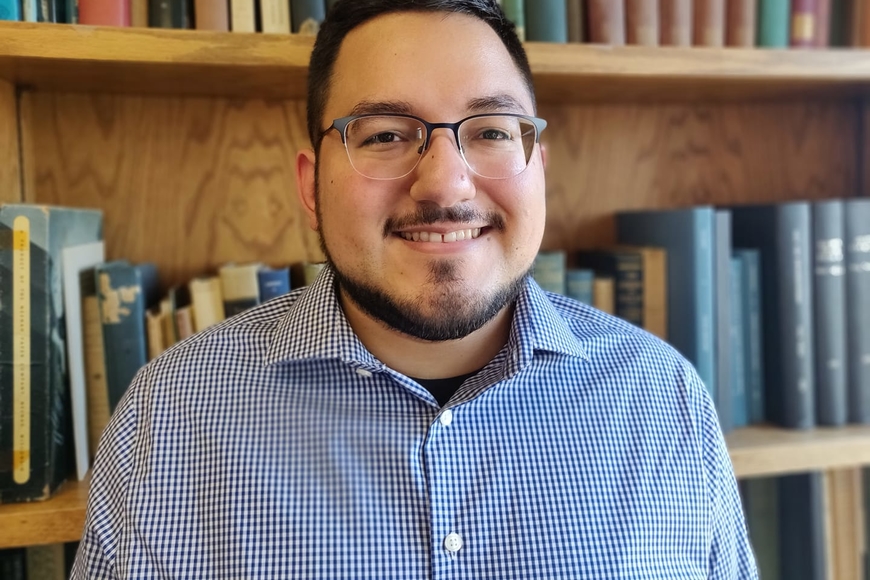Opportunities in Graduate Program Helped Alumnus Realize True Interests
What was your graduate school experience like?
I was in the graduate program from 2013-2019. My first field was American politics with a focus on Congress and race and ethnic politics, and my second field was political theory. I received the Diversity of View & Experience Fellowship in my first year, and was also an American Political Science Association (APSA) Minority Fellow. I was also involved as treasurer of the Graduate Student Life Committee for three years, and I was an assistant coach for the University's undergraduate debate team for three years.
Research-wise, I focused on the role of Latinx members of Congress in representing the Latinx community—this was the focus of my dissertation, as well as some term papers. I worked closely with my advisor Kathryn Pearson, Michael Minta, Joe Soss, and Jane Sumner. I also worked with Elizabeth Beaumont, who was at Minnesota when I started the program but left before I finished. I was Michael's research assistant at one point, helping him with data analysis that he used in his most recent book, and also had the opportunity to present at APSA on a collaboration with Paul Goren.
Teaching-wise, I was the TA for a wide variety of classes, including John Freeman's introductory international relations course and Howard Lavine's political psychology course. I think that variety has helped me as I've taken positions that are teaching-focused and require me to teach more courses than just those in my areas of study.
Why did you choose the University of Minnesota's political science graduate program?
When I was applying to grad school, I was focused on programs with strong records in political theory as well as race and ethnic politics. I chose Minnesota on that basis, and even though my interests shifted, I knew the program had exceptional faculty in American politics, which I had intended as my second field.
Can you describe your current position and your overall career trajectory after grad school?
Currently, I am in a non-tenure-track, but full-time, position as an assistant professor at Our Lady of the Lake University (OLLU) in San Antonio, Texas. OLLU is a small liberal arts college with a heavy emphasis on teaching and service—things that I have prioritized ever since I graduated from Minnesota. My first year after graduating, I taught at St. Olaf College as a visiting assistant professor, and then taught for the next two years at The College of Wooster. These are both small liberal arts colleges with a strong emphasis on teaching and collaborating with undergraduate students, which were qualities I wanted in a job when I was on the academic job market in the 2018-2019 school year. I'm originally from San Antonio, so coming back was something I had always thought about, but didn't really plan on until I saw the position post for OLLU during the 2021-2022 school year.
What did you do during your time as a graduate student to prepare for your career after graduating?
While I was a grad student, I did my best to get teaching experience so that I would be ready to teach my own classes once I graduated. I opted to TA as much as possible instead of trying to be an RA for faculty members, and take as many opportunities as I could to guest lecture. I also spoke with faculty and other grad students about teaching—how to do it effectively, and how to prepare and manage classes throughout the semester—as well as how to balance effective teaching and research. The department did a lot to help in this regard, including holding workshops and panels with both faculty and more advanced graduate students to talk about teaching, balancing teaching and research, and navigating the role of faculty. During my last two years in the program, I developed sample syllabi and reading lists for classes that I could see myself teaching as a faculty member; that way, I would not be scrambling to put actual syllabi together once I had a position. I also developed potential assignments and activities to use in the classroom to ensure students were effectively learning, and talked about these with other grad students.
What advice would you give to political science graduate students?
It's okay if you don't have everything figured out on day one, and it's okay if your interests change over your time in graduate school. When I started, I thought I would focus on political theory and spend less time in American politics, but after a semester I realized that my interests were actually flipped. I also had no idea that I wanted to focus on Congress and institutional politics until my second year—I knew from the start I wanted to focus on race and ethnic politics, but I had not envisioned doing so through analysis of Congress and groups like the Congressional Hispanic Caucus.
I also didn't think I wanted to work at a small liberal arts college when I started. I thought, like I think a lot of people do, that I wanted to be at an R1 where my primary focus was research. But that changed, and that's okay. You're not locked into whatever you put in your application materials, and part of grad school is getting to explore the discipline more, which naturally exposes you to areas you perhaps hadn't considered before and which hold your interest more than you might expect.
Additionally, it's okay to interact with people from different subfields. I think I had some of the most interesting and enlightening conversations with fellow grad students who were focused on international relations, theory, or comparative politics. Just because you have different research interests doesn't mean you can't have conversations with each other about politics, and those conversations can help you become a better thinker and writer in ways that you might not if you only talk to people who share the same reference points for thinking about politics.
